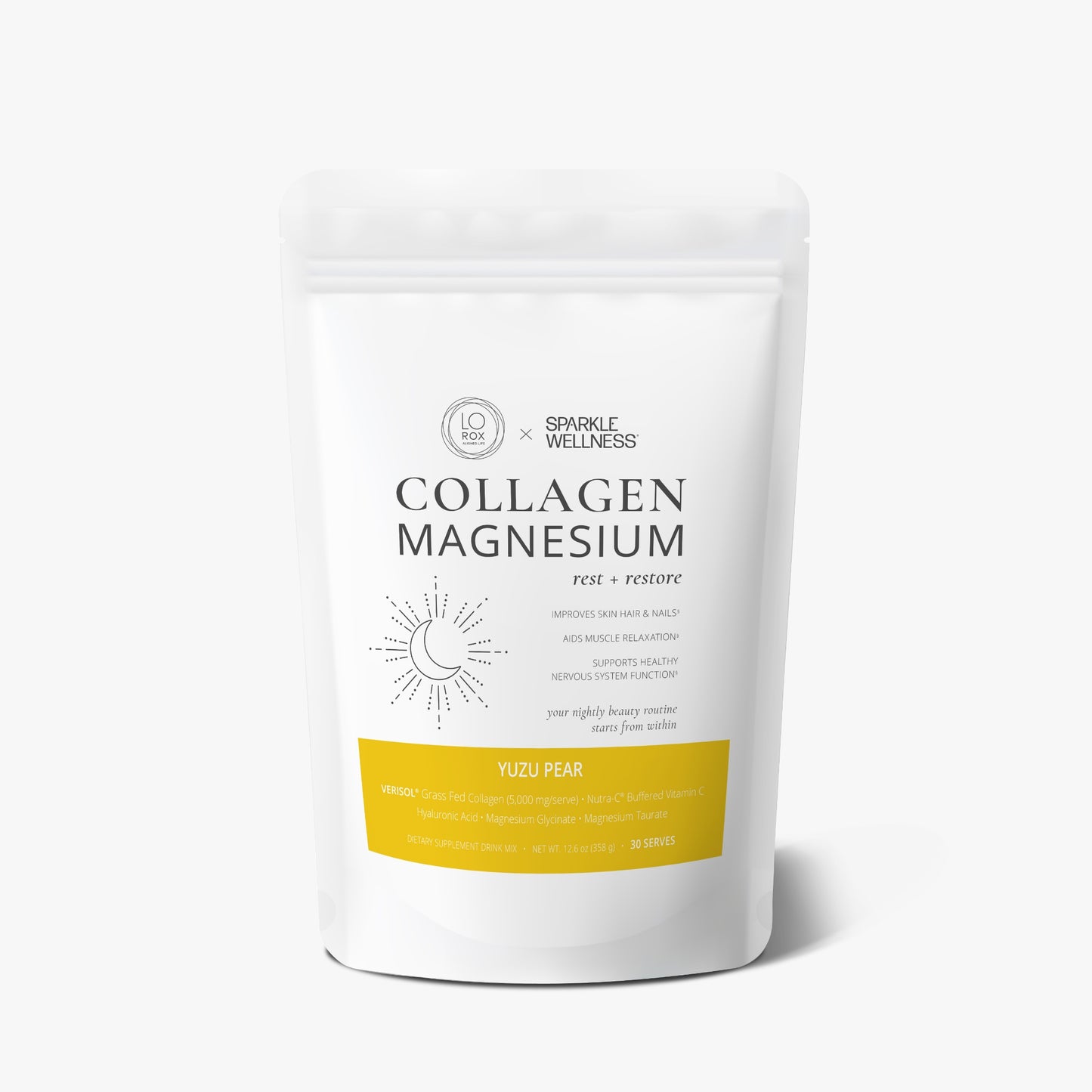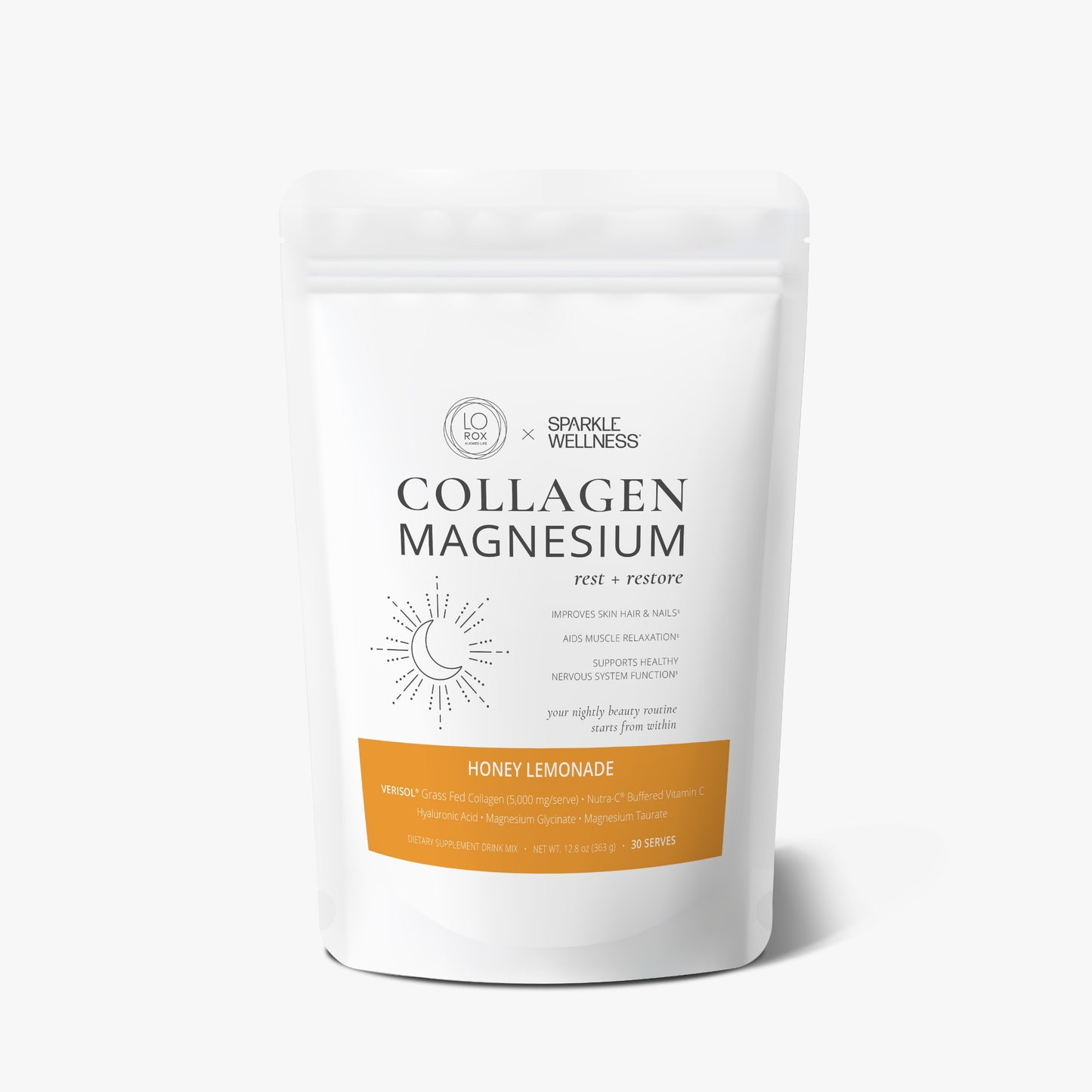Magnesium Before Bed: Can it help with sleep?
Written by Matthew Farrell
Wellness content writer
Have you ever tossed and turned all night, yearning for a restful slumber? Many of us experience occasional sleep difficulties, leaving us feeling drained and longing for a solution. Fortunately, nature may hold the key: magnesium. This essential mineral plays a fascinating role in promoting peaceful relaxation and may unlock a better night's rest.
Over the years, some research has shed light on the powerful connection between magnesium and sleep quality. And while more research is required in this area and further evidence is needed to fully understand the benefits of taking magnesium at night, there is enough available research to begin answering some common questions.
Does magnesium help with sleep? What is the best magnesium for rest? We’ll explore these questions and take a look at some of the science behind magnesium and how it might contribute to a more restful night — and a more radiant you.
The connection between magnesium and sleep
It’s not uncommon for people to deal with sleep issues. Many struggle with getting a full night’s sleep, and while there are a multitude of potential reasons for restless nights, some recent research suggests one potential culprit: magnesium deficiency.
Magnesium is a mineral that has gained significant attention for its potential health benefits, especially when it comes to sleep and relaxation. Magnesium, a vital nutrient, plays a crucial role in numerous bodily functions. These include regulating muscle and nerve activity, maintaining healthy blood sugar and blood pressure levels, and supporting the production of protein, bones and DNA.1 Magnesium is a cofactor for more than 300 different enzymatic processes and therefore plays a role in virtually every process in the cell.2,3
Some studies have shown that people with low magnesium levels are more likely to experience sleep disorders4, and supplementing with magnesium has been shown to improve sleep quality in some individuals with low magnesium levels. A 2002 study found that taking magnesium at night before bed led to an increase in slow-wave sleep, which is the deepest phase of sleep.5,6
Studies also show that lower intakes of magnesium are associated with shorter sleep time7, as magnesium appears to be involved in regulating circadian rhythms.8 Additional studies have focused on the importance of magnesium for older adults, how magnesium levels change as we age, and the impacts of lower magnesium on health.
As we age, our bodies absorb and use magnesium less efficiently, which can eventually lead to various health difficulties.9 If you believe your magnesium levels are low, there are a few signs you can look for.
Some indications of low magnesium levels may include:
- Feeling tired
- Trouble sleeping
- Mood swings
- Difficulty thinking
While more studies are needed on this topic, research suggests that magnesium might be beneficial for older adults, making it important to include magnesium-rich foods in your diet. To increase your magnesium intake, aim for foods such as legumes, seeds, whole grains and leafy greens. Milk, yogurt and other dairy products are also great sources of magnesium.
Yet if you’re still struggling to reach the recommended daily allowance (320 mg for women over 30, and 420 mg for men over 30), magnesium supplementation can help you hit those goals.
Supplementing with magnesium: Understanding bioavailability
While a balanced diet is the best source of magnesium, supplements can be helpful for addressing any potential deficiencies. However, not all supplements are created equal. When supplementing with magnesium, one of the key factors to consider is bioavailability. The most effective form of magnesium is the form that your body can best absorb.
Bioavailability is the percentage of a substance that reaches circulation when it is introduced to the body and can then have an active effect. For this reason, higher bioavailability is something you want to consider in a magnesium supplement. There are several different forms of magnesium, many of which you can find in your local pharmacy or drugstore, yet not all are absorbed equally by your body.
Understanding magnesium bioavailability is key to reaping its potential benefits. Different forms of magnesium are absorbed by the body at varying rates. By choosing a highly bioavailable form, like magnesium taurate and magnesium glycinate, you can maximize the amount your body can utilize.
Which form of magnesium is best for sleep?
Before you go out and purchase a magnesium supplement for sleep, you’ll want to consider a few factors. To be clear, magnesium is not a sleep aid. Rather, it is a mineral that helps support relaxation, which can help promote a natural calm and better rest. Magnesium won’t make you drowsy or tired, but some forms, like magnesium glycinate and magnesium taurate, can have an indirect impact on your sleep.
If you’re exploring magnesium for relaxation or better rest, products containing magnesium taurate and glycinate, both with high bioavailability, are what you want to look for. These forms of magnesium support the proper function of the nervous system, which may contribute to a calming effect in the body, and aid muscle relaxation, which may promote restfulness. These forms also give you the benefits of the amino acids glycine and taurine in addition to the magnesium. Both magnesium taurate and magnesium glycinate are also highly bioavailable, making them ideal forms of magnesium for rest.
When searching for a magnesium supplement, look for products that contain magnesium glycinate. Highly bioavailable and gentle on the stomach, magnesium glycinate is suitable for those with magnesium deficiencies and emerging evidence is suggesting that glycine may support sleep.10
Take some time to read product labels. The cheapest option on the shelf may not be the most effective. Magnesium oxide, a common option populating store shelves, has lower bioavailability and may provide you with fewer benefits than another, albeit slightly more expensive, choice.
Better rest is the key to a better tomorrow
The benefits of a long, deep sleep are many. In fact, we covered a few of those benefits in a recent blog post. A great night’s rest can improve metabolic health, enhance cognitive function and boost energy levels and alertness.11 And that’s just the start.
If you’re looking to improve your sleep quality, magnesium supplementation is a great natural alternative to sleep aids. Waking up feeling refreshed involves more than just getting six to eight hours of shut-eye — it requires deep, restful sleep. And falling asleep is only half the battle. After you drift off, that’s when the real recovery begins.
Yet the benefits of magnesium go beyond sleep. When your body lacks magnesium, it can create a state of “inflammatory stress.” This stress can contribute to health problems like diabetes and heart disease, which are often linked to poor sleep.12 So, getting enough magnesium may not only help you rest but may improve your overall health, too.
Sparkle Wellness’ Collagen Magnesium Rest + Restore includes both magnesium glycinate and magnesium taurate. But we didn’t stop there. In addition to 1000 mg of glycine and 2000 mg of taurine, we also included 5000 mg of VERISOL, the next generation of collagen peptides that are proven to improve skin, hair and nails from within — and all while you sleep.
We are on a mission to empower people with healthy habits so they can thrive and reach their fullest potential. And healthy habits begin with a great night’s rest. If you’re looking to improve your sleep quality, taking magnesium before bed is something to consider to support relaxation and rest as part of your nighttime routine. However, we always recommend speaking to your doctor or health care professional before taking any supplements or if you’re experiencing more serious sleep issues.
SOURCES
1National Institutes of Health. https://ods.od.nih.gov/factsheets/Magnesium-Consumer/
11NIH: News in Health. https://newsinhealth.nih.gov/2013/04/benefits-slumber






